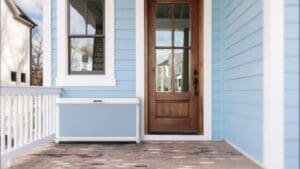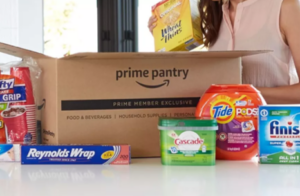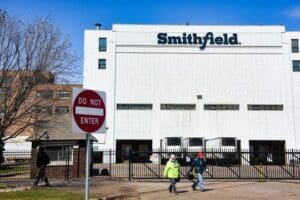It’s that time of year again: Girl Scout Cookie season. Although, in recent years, the season has really been extended to a year-round event as you can buy them online. But there is still the initial rush when consumers can buy them from their local troop. Of course, the coronavirus pandemic is shifting things as it is doubtful Girl Scouts will be going door-to-door or setting up outside of shopping centers this year. So, the online route will likely take center stage. And to make things even easier, I just read that the cookies are available for on-demand delivery. That’s right, the Girl Scouts of America have teamed up with GrubHub in select markets for contactless home-delivery. GrubHub announced that it is waiving all fees associated with sales, ensuring that the proceeds will benefit the troops and council. And now on to this week’s logistics news.
- Verizon Skyward, UPS to further develop drone delivery service
- GM to sell electric delivery vans to FedEx, other fleet buyers
- Walmart will test grocery deliveries to a smart cooler on customers’ doorsteps
- Amazon Pantry is being discontinued
- Albertsons pilots automated grocery pickup kiosk
- Smithfield Foods prepares for COVID-19 vaccine distribution to US employees
- ELDs have improved HOS compliance in first year
- Ahold Delhaize’s RBS pilots UV disinfection robots
 As interest and research has soared for drone deliveries, the COIVD pandemic helped to speed things along. UPS Flight Forward has completed more than 3,800 drone deliveries, with a big uptick in the last 12 months. Now, the company is partnering with Verizon Skyward to bring drone deliveries to the Villages, the retirement community in Florida with more than 77,000 residents. UPS has already partnered with CVS to make drone deliveries at the Villages, so the infrastructure is well known. The Skyward drone platform allows clients to remotely track and manage its drones in the air in real time through an easy-to-use dashboard. The platform also allows drone flights to get instant authorization and keeps track of flight logs and maintenance completed on the drone to ensure it falls within the requirements set by the FAA. The drones will be dispatched from a central location and work with robots and electric delivery vehicles to get the job done.
As interest and research has soared for drone deliveries, the COIVD pandemic helped to speed things along. UPS Flight Forward has completed more than 3,800 drone deliveries, with a big uptick in the last 12 months. Now, the company is partnering with Verizon Skyward to bring drone deliveries to the Villages, the retirement community in Florida with more than 77,000 residents. UPS has already partnered with CVS to make drone deliveries at the Villages, so the infrastructure is well known. The Skyward drone platform allows clients to remotely track and manage its drones in the air in real time through an easy-to-use dashboard. The platform also allows drone flights to get instant authorization and keeps track of flight logs and maintenance completed on the drone to ensure it falls within the requirements set by the FAA. The drones will be dispatched from a central location and work with robots and electric delivery vehicles to get the job done.
General Motors is ramping up its electric vehicle production and betting big on the future of these vehicles. The company is developing a new line of luxury and commercial models to meet what it sees as fast-growing demand for battery-powered vehicles. GM is creating a wholly owned subsidiary named BrightDrop that will supply battery-powered vans and offer fleet-management services. BrightDrop, which plans to sell electric pallet movers this year and an electric cargo van next year, will deliver 500 FedEx delivery vehicles this year. The company’s EV600 delivery vehicle has a 250-mile range, and 170 miles/hour charging on 120kW CCS Combo via GM’s Ultium battery and drivetrain technology.
 As grocery delivery has surged, companies have been trying to figure out the best way to tackle the issue of refrigerated and frozen items. Some will pack the items with ice packs, while others have gone so far as to put groceries away for customers (COVID has clearly made the latter obsolete right now). Walmart is preparing to test its latest method for grocery delivery: smart coolers. Starting this spring, Walmart will pilot a program in Bentonville, AR where it will provide participating customers with a temperature-controlled smart cooler that’s called a HomeValet. The cooler will be placed outside of their home, allowing for secure and contact-free grocery deliveries around the clock. The new service will roll nicely into Walmart’s subscription-based service which includes free, unlimited grocery deliveries as part of the $98 a year service.
As grocery delivery has surged, companies have been trying to figure out the best way to tackle the issue of refrigerated and frozen items. Some will pack the items with ice packs, while others have gone so far as to put groceries away for customers (COVID has clearly made the latter obsolete right now). Walmart is preparing to test its latest method for grocery delivery: smart coolers. Starting this spring, Walmart will pilot a program in Bentonville, AR where it will provide participating customers with a temperature-controlled smart cooler that’s called a HomeValet. The cooler will be placed outside of their home, allowing for secure and contact-free grocery deliveries around the clock. The new service will roll nicely into Walmart’s subscription-based service which includes free, unlimited grocery deliveries as part of the $98 a year service.
 Speaking of grocery delivery, Amazon is changing how it makes some of its grocery deliveries. The company announced this week that it is discontinuing its Amazon Pantry service. The service, which was launched in 2014 as Prime Pantry, charged customers a flat fee of $5.99 per box of groceries; the customer could fill the box with up to 45 pounds or four cubic feet of products (whichever came first). The goal was to make it easier to stock up on bulk items which would have otherwise been more expensive to ship separately. Those items that were sold through Amazon Pantry will now be rolled into the main Amazon website where they can be ordered along with the rest of Amazon’s products.
Speaking of grocery delivery, Amazon is changing how it makes some of its grocery deliveries. The company announced this week that it is discontinuing its Amazon Pantry service. The service, which was launched in 2014 as Prime Pantry, charged customers a flat fee of $5.99 per box of groceries; the customer could fill the box with up to 45 pounds or four cubic feet of products (whichever came first). The goal was to make it easier to stock up on bulk items which would have otherwise been more expensive to ship separately. Those items that were sold through Amazon Pantry will now be rolled into the main Amazon website where they can be ordered along with the rest of Amazon’s products.
Not all customers want grocery delivery these days, even if they are ordering online. For some customers it is simply more convenient to order online and choose when and where they will pick up an order. Albertsons is piloting a new contactless pick-up kiosk at its Jewel-Osco stores in Chicago. The kiosk will be both automated and temperature controlled, offering a contactless pick-up experience. Upon check-out, customers can select the Kiosk Pick-Up option and will be offered a two-hour time slot for which to retrieve their order. The customer scans a code on their phone at the kiosk and their order is robotically delivered to the front of the kiosk. The kiosk has two temperature zone, regular and deep-freeze, and a customer’s order can be stored on both and delivered at the same time. There is no timetable to roll out the program to other stores yet, except for a Bay Area Safeway store in the near future.
 From the onset of the COVID pandemic, meatpacking workers were some of the hardest hit, given the close working conditions of their job. In mid-April, Smithfield Foods closed its Sioux Falls pork facility after a spike in COVID-19 cases. Now the world’s largest pork processor is one of the first companies in the US to say it is preparing to vaccinate workers. According to federal guidance by the U.S. Centers for Disease Control and Prevention, food and agricultural workers are scheduled to receive the vaccine in a later phase, after healthcare workers and people over the age of 75. In Missouri, where Smithfield owns meat plants and hog farms, state officials encouraged the company’s moves. The company has said that while it has the medical capabilities at US plants, it would not share details on its plans and said circumstances vary by state.
From the onset of the COVID pandemic, meatpacking workers were some of the hardest hit, given the close working conditions of their job. In mid-April, Smithfield Foods closed its Sioux Falls pork facility after a spike in COVID-19 cases. Now the world’s largest pork processor is one of the first companies in the US to say it is preparing to vaccinate workers. According to federal guidance by the U.S. Centers for Disease Control and Prevention, food and agricultural workers are scheduled to receive the vaccine in a later phase, after healthcare workers and people over the age of 75. In Missouri, where Smithfield owns meat plants and hog farms, state officials encouraged the company’s moves. The company has said that while it has the medical capabilities at US plants, it would not share details on its plans and said circumstances vary by state.
The federal electronic logging device (ELD) mandate took effect just over a year ago. One year in, industry experts say that the ELD mandate has leveled the playing field among motor carriers and reduced driver hours-of-service (HOS) violations. The mandate requires nearly all long-haul carriers to record drivers’ HOS data with ELDs instead of paper logbooks. The Federal Motor Carrier Safety Administration (FMCSA) estimated that ELDs would result in 1,844 crashes avoided annually, 562 fewer injuries per year and 26 lives saved each year. According to FMCSA data, overall driver violations at roadside inspections decreased to 784,188 in fiscal 2020, down from 1,023,654 in fiscal 2018.
Autonomous mobile robots are not a new addition to retail stores, as we have written multiple times here about aisle roaming robots that scan shelves, track inventory, and clean up spills. We have even seen companies developing robots to disinfect stores during the age of COVID. Ahold Delhaize USA’s Retail Business Services (RBS) arm is testing ultraviolet disinfection robots in two distribution centers to support stepped-up cleaning procedures during the COVID-19 pandemic. The program is using robots from Cambridge, MA-based Ava Robotics at Ahold Delhaize’s affiliated DCs in Schodack, NY and Dunn, NC. In announcing the initiative, Ava said Ahold Delhaize is the first grocery retailer to employ the technology.
That’s all for this week. Enjoy the weekend and the song of the week, the North Mississippi Allstars’ Sugartown.

















